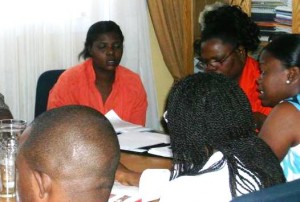Benny Sikhakhane, consultant for the IYCN Project, shares his experiences working on a community-based nutritional measurement project in South Africa.
On October 20th, I conducted an orientation for 46 community volunteers, including young mothers, grandmothers, and a grandfather, who had been chosen to lead weekly nutritional measurements of children and pregnant women in Nigel, South Africa. The volunteers conducted measurements for six consecutive weeks from October to December in eight different sites that varied from open spaces, to schools, to churches, and even to a community member’s house, and allowed mothers access to important information on the growth and nutrition of their children, close to where they lived.

Members of a ward committee meet in Nigel, South Africa to discuss integrating nutrition interventions into development programs.
I trained the volunteers on how to use scales to weigh children, to measure mid-upper arm circumference (MUAC), and to record measurements for each child. I also trained them on how to interpret the data and on actions to take for children requiring urgent care. Additionally, we discussed simple messages on proper infant and young child feeding that the volunteers could share with mothers during weekly visits. The trainings had a very personal touch, as some of the volunteers brought their own children to help with practice using the scales and MUAC bands.
The ward committee, which included many of the volunteers, chose to conduct the session weekly because of their enthusiasm for the program and their desire to really connect with the care of children. I visited the sites each Friday to provide support to the volunteers and to ensure that they were measuring, recording, and interpreting the data correctly, and to provide counseling for mothers on changes in weight. I was very excited to see the great turnout and positive reaction from the community. The response was overwhelming, and most of the sites were overflowing with mothers, especially during the first three sessions. Each week, we had a total of about 250 mothers and children participate at different sites, and the volunteers showed a real ownership of the activity. In fact, at one of the sites, the volunteers dipped into their own pockets to buy batteries for a borrowed loudspeaker used to make announcements to encourage mothers to attend. At other sites, volunteers went door to door to make certain mothers and children came out for their weekly visits.
This community-based nutritional measurement project was the first activity of an innovative new partnership formed between the IYCN Project and J&J Development Projects Trust in South Africa to integrate nutrition into existing community development programs. We are employing a community development approach to mobilize communities to adapt existing structures (such as Ward Committees and municipal clinic staff) that have shown success and impact to include nutrition support in their programs. The focus is on improving the nutritional status, dietary intake, and feeding practices of infants and young children less than 2 years of age, orphans and vulnerable children up to 5 years, and pregnant and lactating women.
J&J Trust has led ongoing community development projects in South Africa, such as social cohesion through sports development and housing development aimed at improving township establishments in Nigel, a subdistrict of more than 140,000 people located outside of Johannesburg. IYCN chose to collaborate with J&J Trust in Ward 86 because it is the poorest ward in Nigel, and it is willing to address problems of malnutrition within pre-existing development projects. IYCN and J&J’s work began with a series of meetings and trainings with stakeholders and decision-makers, including the Department of Health, local government officials, and Ward Committee members, to ensure our work is in line with government priorities, and to orient them on the linkages between nutrition and development and why it is critical to integrate nutrition into the current planning process.
In addition to helping mothers track the growth of their children and understand the impact proper nutrition has on improved nutritional status and growth, we also collected a large amount of data on child growth. In collaboration with local government staff, the project team will finalize data analysis and conduct a feedback meeting with the Ward 86 Committee and key stakeholders. The meeting will include a discussion on how to integrate the findings into the ongoing community-based planning process. Additionally, we will assist the committee with conduct planning sessions to integrate nutrition into their 2010 development plan and budget.
I have seen the level of interest in nutrition in the community increase, and now members are empowered to influence the development plans of the municipality and the district to prioritize support for nutrition.
Learn more about IYCN activities in South Africa.
Photo: Benny Sikhakhane
Date: Feb 11, 2010 | Category: Updates from the field
